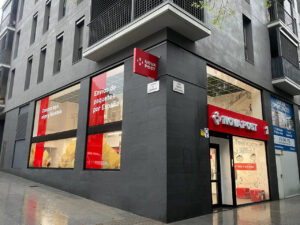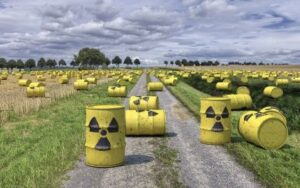
Turkmenistan is ready to export natural gas to European countries, said Gurbanguly Berdimuhamedov, former head of the country and current chairman of the People’s Council. He emphasized the strategic importance of cooperation with Europe in the field of energy resources, noting that the European market is one of the largest in the world.
Berdimuhamedov drew attention to the fact that Turkmenistan ranks fourth in the world ranking in terms of natural gas reserves. “I will give another concrete example: the Galkynyş field ranks first in the world in terms of gas reserves. Its reserves amount to 27.4 trillion cubic meters. These figures show that our country’s export potential allows us to meet the energy needs not only of our own, but also of our partners in the region and beyond,” the politician said.

“Nova Poshta has launched a service for sending parcels between European countries where it has a Nova Post office.
The service is available in all countries where the company operates, except for Moldova, Romania, and the United Kingdom, the press service of Nova Poshta reported on Friday.
“Our mission is to make delivery easy for life and business. That is why we are not only expanding our network, but also expanding the range of services. From now on, Nova Post unites not only the EU with Ukraine, but also European countries with each other, providing fast, easy and safe delivery within two days,” commented Volodymyr Popereshnyuk, co-owner of Nova Poshta.
“Nova Poshta” customers from European countries can send documents, parcels or cargo up to 100 kg to other foreign branches of the company. The shipments are delivered to the branch, to the address, to a post office or to a parcel delivery point. The cost of delivery depends on the weight of the shipment and the distance between the countries. If you send a 2 kg parcel from Poland to Germany, the price at a Nova Post office will be PLN43, and to Spain – PLN65. Ordering a courier service will cost PLN10 in addition to the cost, the press service of Nova Poshta said.
It is noted that digital tools are also available for international shipments: a multilingual website, a mobile application, and a business account.
Earlier, Nova Poshta opened the first two Nova Post branches in the UK, and on the eve of April 30 – in Spain.
“Nova Poshta has more than 35 thousand points of service for sending and receiving parcels in Europe, of which 90 are its own Nova Post offices in 13 countries: Estonia, Poland, Lithuania, Latvia, the Czech Republic, Romania, Germany, Slovakia, Italy, Hungary, Moldova, Spain and the UK.

Stock indices of the countries of Western Europe are changing multidirectionally at trading on Wednesday, but the overall dynamics is rather negative due to weak statistical data from the euro zone.
The composite index of the largest European companies Stoxx Europe 600 as of 11:47 a.m. fell by 0.16% and amounted to 459.09 points.
British indicator FTSE 100 added 0.13%, Italian FTSE MIB – 0.26%. Meanwhile, Germany’s DAX lost 0.3%, France’s CAC 40 lost 0.25% and Spain’s IBEX 35 lost 0.23%.
The composite index of business and consumer confidence in the eurozone in August fell to 93.3 points from 94.5 points a month earlier. The index fell for the fourth consecutive month, and its value became the lowest since November 2020.
Meanwhile, inflation in Spain accelerated to 2.6% in August from 2.3% in July, preliminary official data showed. Excluding energy and food prices, consumer prices rose 6.1% in August after rising 6.2% in July.
Prices of goods imported into Germany collapsed 13.2% in July, the fastest pace since January 1987, due to falling energy costs, the country’s Federal Statistical Office (Destatis) said.
Producer prices in Austria fell 1.3% year-on-year in July, declining for the first time in two and a half years.
Shares of British insurer Prudential Plc. are rising 3.3% on data showing operating profit rose 6% in the first half of the year to $1.46 billion.
Meanwhile, ASR Nederland’s securities are getting cheaper by 0.5%. The Dutch insurance company posted an operating profit of €460 million in the first half of the year against a revised €454 million in the same period a year earlier.
Quotes securities Rio Tinto in London are up 0.7%, while the market value of Anglo American, Glencore and Antofagasta declines by 0.1-1%.
The price of securities of British banks Barclays, Standard Chartered and Lloyds increases by about 0.8%.
In Germany, the leader of growth are the shares of Commerzbank, rising in price by 1.3%, the leaders of the decline – the securities of RWE and Siemens Energy, falling in price by 3.4% and 2.6%, respectively.
At the auction in Milan actively growing quotations of securities Banca Monte dei Paschi di Siena (by 2.3%), in Paris – shares Capgemini (by 1.3%), and in Madrid falls in the price of shares Iberdrola (by 2.5%).

Abnormal heat continues to inconvenience residents of several southern European countries, particularly Spain and Italy, European media reported on Wednesday.
Temperatures in Sicily approached 47 degrees Celsius during the day, with the highest temperatures recorded in Agrigento and Trapani. The island’s health services report a 20% increase in the number of citizens’ visits to hospitals.
In at least 20 cities in Italy continues to operate introduced by the authorities of the heightened level of danger due to the heat wave. We are talking, including Rome, Florence and Bologna. Italian Health Minister Orazio Scilacci urged residents and tourists to be extra vigilant and avoid staying in direct sunlight from 11:00 to 18:00. Meanwhile, Rome is experiencing power outages amid a surge in the use of air conditioners.
Spanish meteorological services on Wednesday reported that the average temperature of coastal waters broke the record for this time of year. Thus, the water warmed to an average of 24.6 degrees Celsius, 2.2 degrees higher than the average for this time. In some parts, the water temperature exceeded 28 degrees Celsius.
The situation is difficult in Greece and Cyprus. Greek forecasters are recording peaks of 39 degrees Celsius in the east of the country and 41 degrees in the west. In addition, Athens is expecting 43 degrees Celsius by the weekend. In Cyprus, temperatures of around 40 degrees Celsius are being recorded, with the situation forecast to worsen on Friday and Saturday, which is expected to be even hotter.
In Greece, natural fires continue to spread amid the 40-degree heat wave. Hundreds of people have been evacuated. Firefighters from other countries, including Poland, Romania and Slovakia, are involved in the fight against the fire.
On the eve in a number of regions in the south-east of France recorded temperature records. In the department of Ariège the air warmed up to 40.6 degrees Celsius for the first time in the history of meteorological observations. Record temperature was also recorded in Renno in Corsica – 38.3 degrees Celsius.
In addition, the water in the Mediterranean Sea near Nice warmed to 29.2 degrees Celsius, the highest ever recorded in the region.
The World Meteorological Organization (WMO) warned the day before that temperatures above 40 degrees Celsius will last in many parts of the world for several days.

The stock indices of the largest Western European countries are declining at the beginning of trading on Monday, followed by bank stocks.
The Stoxx Europe 600 composite index of Europe’s largest companies was down 0.6 percent at 11:18 a.m. and stood at 433.8 points.
Germany’s DAX indicator fell 0.4% from market opening, Britain’s FTSE 100 – 0.8%, France’s CAC 40 – 0.3%. Spain’s IBEX 35 lost 1%, Italy’s FTSE MIB – 0.7%.
It was announced Sunday that Swiss bank UBS is buying struggling Credit Suisse for 3 billion Swiss francs ($3.25 billion). UBS will pay 0.76 francs per Credit Suisse share. The deal will be paid in full in cash.
In the course of trading on Monday quotations of Credit Suisse shares collapsed by almost 60% – down to 0.78 francs. Price of UBS securities fell by 9.9%. The UBS shares are the leaders of the decrease among the companies included in the calculation of the Stoxx 600.
Shares of other European banks are also getting cheaper: ING down 6.6%, Deutsche Bank down 6.4%, Intermediate Capital Group down 4.8%, Barclays down 4.7%, Standard Chartered down 4.1%, HSBC down 3.1%, NatWest down 3% and Commerzbank down 3.7%, Societe Generale – 4.4%, Credit Agricole – 1.9%, BPER Banca – 3.8%, UniCredit – 2.3%, Banco de Sabadell – 3.7%, Unicaja Banco – 3.3%, CaixaBank – 2%, Banco Santander – 1.7%.
Oil prices were followed by declines in fuel producers, including Repsol down 1.9%, BP Plc (SPB: BP) down 0.5%, Shell (SPB: RDS.A) down 1.4%, TotalEnergies (SPB: TOT) down 1.1%.
The price of Electrolux securities is increasing by 2.7%. The Swedish household appliances maker said its financial targets remain unchanged. In particular, the company is going to reach 6% operating profit margin in the mid-term.
Meanwhile, the growth rate of producer prices (PPI) in Germany slowed to its lowest in seventeen months in February, according to the country’s statistical office. The index rose 15.8% compared to the same month last year thanks to a less significant increase in energy costs.
Analysts had expected a 14.5% increase, according to Trading Economics.
The PPI index in February relative to the previous month decreased by 0.3%. Thus, it declined for the fifth month in a row.

Ukraine may eventually become a supplier of nuclear fuel based on the technology of American Westinghouse to European countries, Energy Minister Herman Galushchenko said during a visit to a Ukrainian enterprise where it is planned to assemble nuclear fuel (fuel assemblies (FAs) – IFU) for Russian-made VVER-1000 and VVER-440 reactors on March 16.
“Ukraine, having rejected Russian nuclear fuel, has switched its nuclear power units to nuclear fuel from the American manufacturer Westinghouse. The Czech Republic, Slovakia, Finland and Bulgaria have also expressed their desire to make such a transition. Ukraine may become a supplier of nuclear fuel for these countries in the future,” he said.
According to the Minister, during the first stage of setting up production of fuel assemblies of Westinghouse technology at the Ukrainian company, we are going to produce their components within two years. In particular, it is planned to finish licensing and to start commercial production of shanks in 2023 and fuel cassettes’ heads in 2024. These components will be used to produce nuclear fuel for Energoatom’s needs at Westinghouse’s facility in Vesteros in Sweden.
As Peter Kotin, president of NAEK Energoatom, complemented the minister, the company plans to establish its own nuclear fuel production line in three years in general.
“It is planned that in three years we will reach the full cycle of nuclear fuel production in Ukraine. 2026 is the date when we will be able to fully produce our Ukrainian fuel from components made here. And the elements which we cannot produce we will buy from our partners,” explained Kotin.
He also noted the importance of production of nuclear fuel for VVER-440 type reactors which used to be produced only by Russia.
Currently there are 17 VVER-440 reactors functioning in Europe, which have no alternative to Russian fuel so far, and after setting up production of fuel assemblies for VVER-1000 reactors Ukraine will start to produce fuel for VVER-440 reactors as well.
Energoatom CEO emphasized that together with its strategic partner Westinghouse the company may then become an alternative supplier of nuclear fuel for other European countries which use Soviet-type reactors, such as Czech Republic, Slovakia, Finland and Bulgaria.
In turn, according to Galushchenko, Ukraine is one of the world leaders in nuclear power engineering and currently Ukrainian nuclear specialists together with their American partners are working to oust Russia from the world market of nuclear technologies.
As the NAEK informed, cooperation between Energoatom and Westinghouse on nuclear fuel production began in August 2018 when the American partner began qualifying one of NAEK’s separate divisions as a supplier of TVS-WR heads and liners. During 2019-2020, work was organized to produce them for Westinghouse Electric Sweden AB fuel assemblies.
In April 2022, the first batch of head components was manufactured and shipped to Westinghouse for qualification.
As reported, in March 2022, after Russia’s full-scale invasion of Ukraine, Energoatom completely abandoned the purchase of Russian nuclear fuel.
“Energoatom and Westinghouse signed an agreement on June 2, 2022 to supply nuclear fuel to all Ukrainian nuclear power plants with 15 power units.